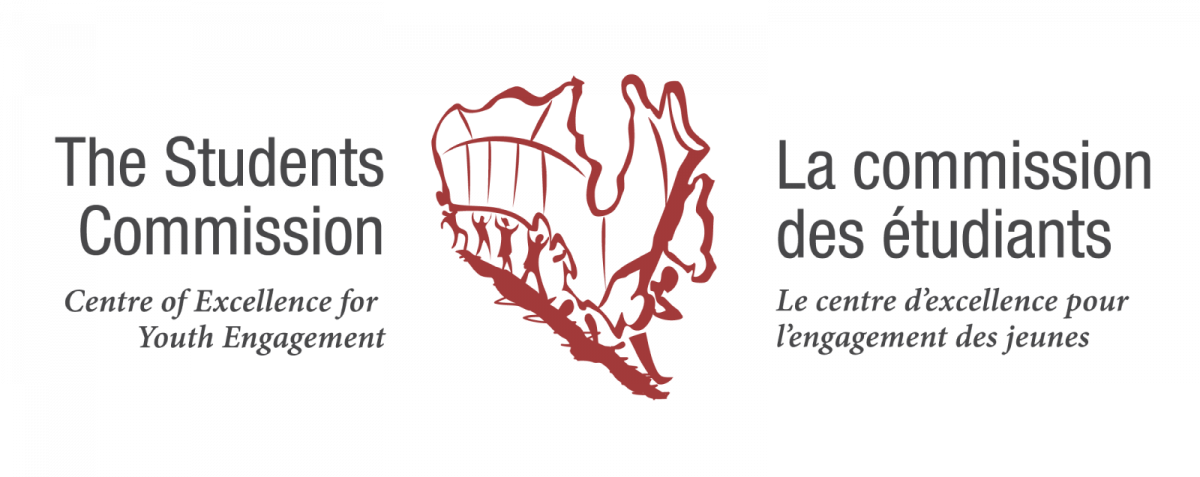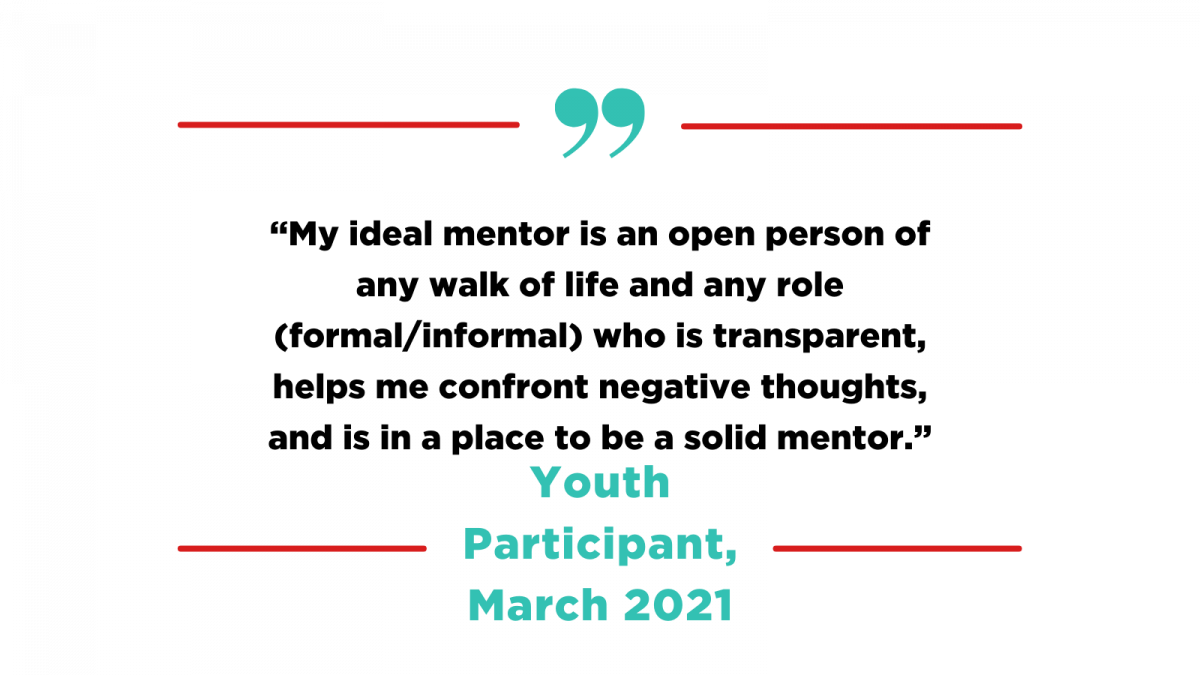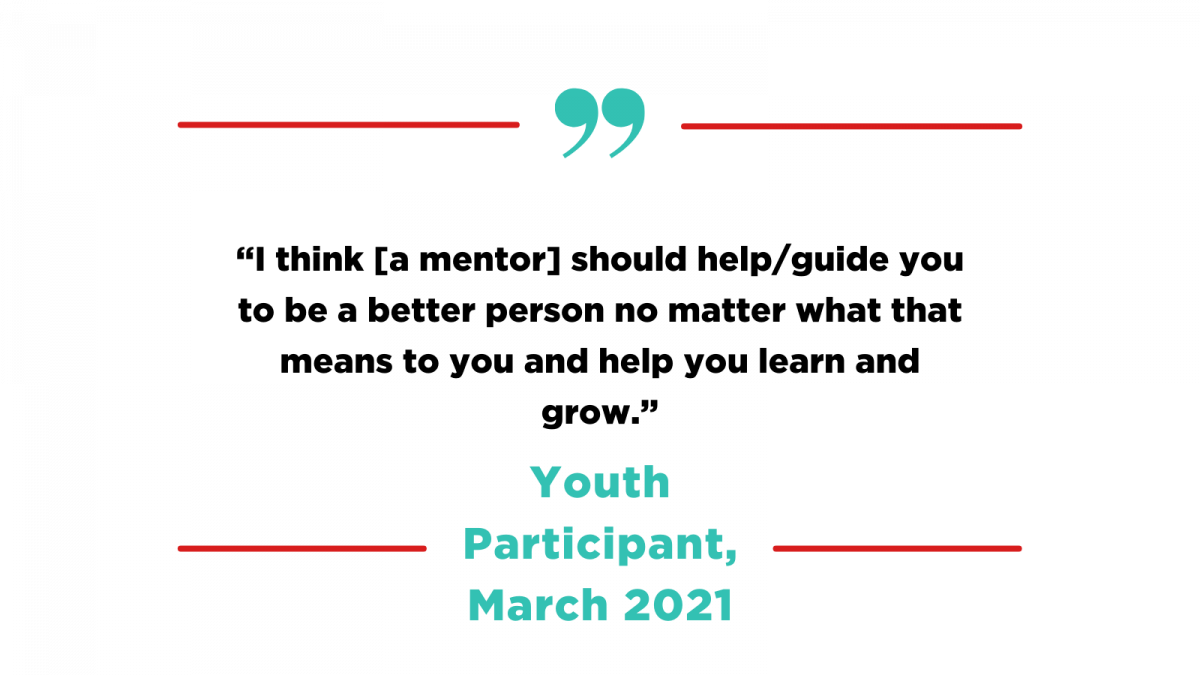
Several among us are aware of the difference that the presence of a kind, caring adult can have on our journey towards adulthood.
Many of us, in fact, were lucky enough to have a person we considered a mentor to support us at some point throughout that journey. However, nearly half of young people in Canada grow up without the support of any mentor. Over one-third of young adults faced barriers accessing mentors during their adolescence. Most often, they did not know how to find a mentor, did not understand the value of mentoring, or did not have access to mentoring programs.
MENTOR Canada and the Students Commission of Canada (the SCC) have partnered to explore how we can Build a Mentoring Movement and ensure that more young people have access to mentors while growing up.
To learn how we can build a mentoring movement responsive to youth’s goals and needs, we meaningfully engaged young people during the #CanadaWeWant National youth conference; held virtually in March 2021.

Who is the Students Commission of Canada (SCC)?
The SCC is a charitable organization that purposely works with others to help create a world where young people are valued and heard, and where their ideas for improving themselves, the lives of their peers and communities, are put into action. The #CanadaWeWant Conference engages youth from all around Canada to discuss issues and topics in theme teams and create recommendations for critical stakeholders. This year, seven very vocal youth participants with unique and diverse perspectives representing members of the 2SLGBTQ+, BIPOC, and Immigrant youth, as well as youth from rural and remote communities, participated in the conference theme team: “Building a Mentoring Movement in Canada”. This theme team was facilitated by two staff members of the SCC who also shared their unique experiences with mentoring - both as mentors and as mentees. During the final day of the conference, youth were invited to share their recommendations during a National Showcase event, where organizations like MENTOR Canada were invited to listen.
Recommendations
Discover the recommendations from the young people
It is important to note that these recommendations are kept in the language used and presented by the youth, to ensure the integrity of the youth voice is maintained.
- The first suggestion is based on a gap, and room for innovation: Youth in Canada deserve to have access to mentorship programs that cover practical and life skills. Equity and inclusivity should be guiding factors in ensuring the health and wellbeing of Canadian youth. Youth participants recommend mentorship programs be made available to youth to cover content valuable to their personal development such as life and practical skills.
- Youth believe that it is crucial that mentorship happens within public education settings, though they feel this should be led by organizations which facilitate mentorship opportunities working in partnership with schools.
- Initiate proactive and preventive mentorship opportunities.
- In certain cases, mentors should be prepared to adapt to youth in a way that allows for respect for their privacy - notably through the use of virtual platforms for mentoring.
- Youth encourage organizations considering mentorship programs to educate and train mentors and teachers. Through such training, mentors will be able to learn how to create a safe space that is inclusive and supportive of both the mentee and mentor.
- Focus on informal mentoring relationships to develop greater rapport between mentee and mentor by helping prepare adults to become mentors.
- Youth recommend that mentoring organizations consider expanding to include youth advisory panels. Youth advisory panels would HAVE TO acknowledge principles of equity, diversity and inclusion such that they should include youth from all different identities and experiences.
- It’s critical to involve youth across diverse perspectives from the beginning of the program development process as opposed to engaging youth towards the end of a project to “confirm” that it caters to youth’s needs. Youth voice is essential for speaking to the action, purpose, advocacy and other core needs of the programs.



Our journey to close the mentoring gap continues.
Over the summer months, MENTOR Canada and the SCC will continue to work with youth to explore how these recommendations might be put into action. Meeting young people where they are at is critical in our efforts to support the creation of supportive mentoring relationships.
To learn more about the conference and recommendations, you can consult the full “Building a Mentoring Movement” report.